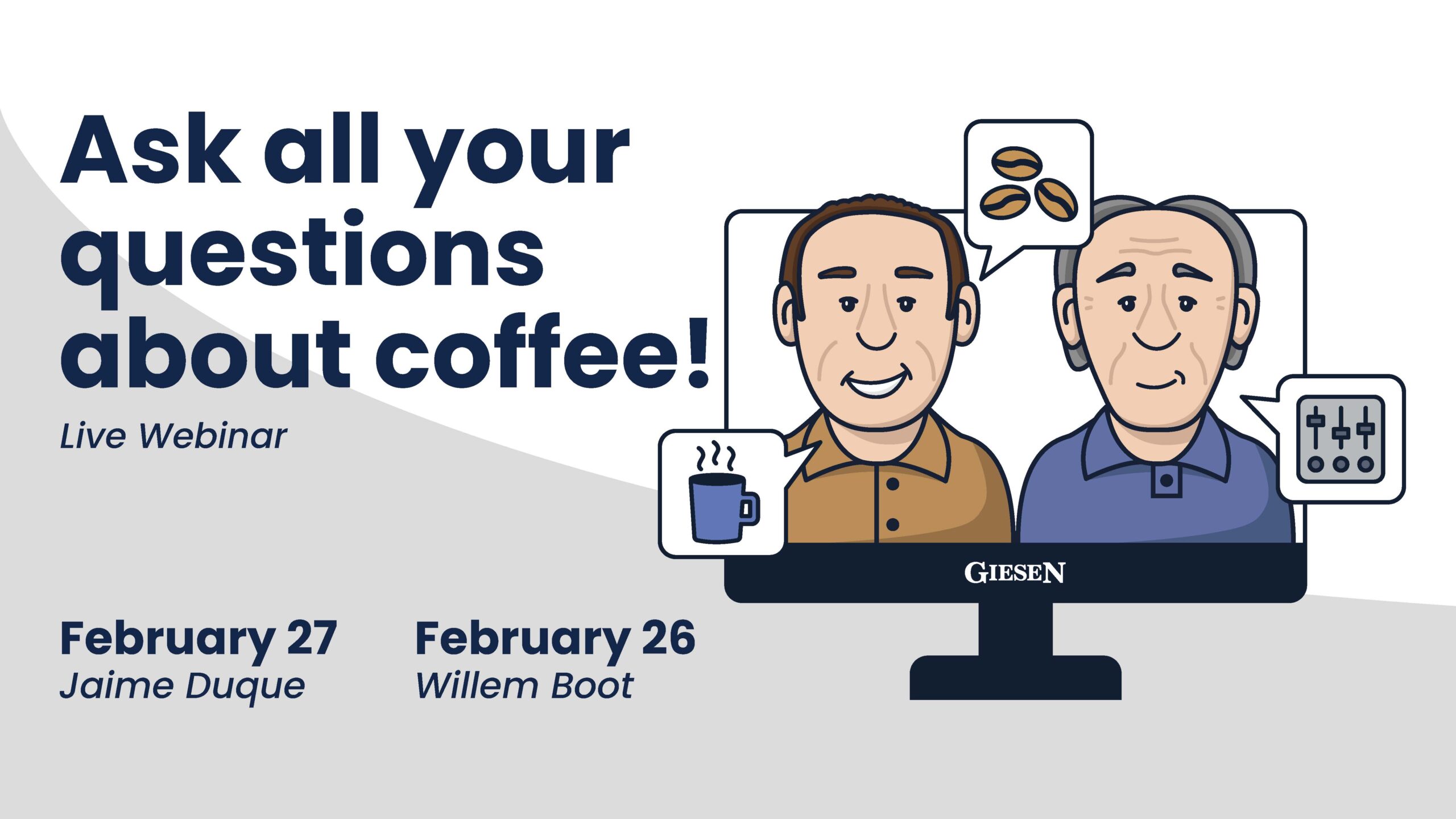One of the key strengths of our coffee roasters is the fact that all roaster settings are customizable. This works two ways; on one side, you have all the freedom you need to find your perfect roast and personalize your roasts. On the other side, it can be a bit much in the beginning, and the question of where to start may rise. In this blog, we will explain all the settings you can change on a Giesen Coffee Roaster. This way, you will learn what each variable means, and which effect a variable change will have on your roast.
Roaster settings: Drum speed
The drum speed determines how fast the drum in your machine spins. This setting can be changed on every Giesen Coffee Roaster according to your preferences. On our machines, we indicate the speed in Hertz (Hz) or RPM. Adjusting your drum speed affects the duration of which your coffee beans are exposed to heat. A fast drum speed pushes the coffee to the outside of the drum which is caused by the centrifugal force. This means the beans will heat up due to the conduction from the drum rather than the heat coming from the airflow.
At low speed, the beans have more fall-time, which is the short period wherein the beans fall inside the drum. When the drum speed is far too low the beans won’t have any fall time at all, and will stay at the bottom of the drum. This means that some beans will be very close to the burner and the beans don’t roast evenly; some will be roasted about right, some will be burnt and some haven’t roasted long enough. A drum speed that’s just right will make sure the beans mix well, and the heat is transferred right.
Air temperature setting
One of the more self-explanatory roaster settings but a very important one; the air temperature. On every Giesen Coffee Roaster, you can determine the temperature setpoint at any point in your roast. Defining the temperature setpoint is up to you as the roaster; every roaster has their theories and methods of creating the perfect roast. The temperature setpoint therefore may highly vary compared to other roasters. You can imagine that the air temperature will distinctly affect your coffee. You define your roast profile by the duration you roast your beans and at which temperature you do this. With the air temperature, you control the temperature rise and can reduce the roast temperature during your roast. When you change the set temperature and for which duration is completely up to you.
More information on how to roast with the temperature setpoint option? Check out the blog written by our ambassador Willem Boot by clicking here.

Burner power percentage
Of all the available roaster settings, the burner power determines how powerful the burner will operate. The burner’s automatic setting will most of the time determine this. When you, for example, select an air temperature setpoint of 190 °C the automatic setting will lead your roaster up to this temperature as efficiently as possible. This means the control panel will ensure the temperature will be reached as quickly as possible without exceeding the set temperature. You can, however, choose to deviate from the automatic operation. This way, you can manually determine how powerful the burner operates.
Imagine the actual air temperature is 190 °C and the temperature setpoint is 210 °C. When you keep the burner power at a high percentage, the machine will reach the temperature setpoint as quickly as possible. However, the manual mode allows you to program a slower rate of temperature rise by selecting a lower power percentage. In summary; when you want to reach the temperature setpoint as efficient and quick as possible, the automatic setting will do the job. On the other hand, when you want to accomplish a slower temperature rise, you can use the manual setting to set the burner power. This means it will take longer for the machine to reach the temperature setpoint, but does realize the smooth rise of temperature you may be looking for.
Roaster settings: Drum underpressure
This roaster setting affects the underpressure inside your roaster. With that, we mean the state of the airflow in the roaster. With this setting, you can pick a set pressure point which the roaster will constantly adapt itself to. On all of our machines, this is indicated using Pascal (Pa). By increasing this setting the machine will increase the rotation speed of the roasting fan. This to maintain the higher pressure target you just set by increasing the Pa value. You can change this value during your roast to meet the requirements of your profile. Summarized; instead of picking a set airflow fan speed, you pick a set underpressure variable which the machine will constantly refer to. This way you will create the same stable, measurable underpressure degree with every roast.
But what does underpressure do to the development of your roast? Well, more air at higher temperatures can accelerate the heat transfer and increase the Rate of Rise (RoR). More air at lower heat input levels, will slow down the heat transfer and decrease the RoR. The flavor is affected as follows; more airflow accentuates the sweetness and brightness of your coffee. Too much airflow on the other hand can create sourness. Too little airflow mutes the acidity and possibly leads up to a leather-like taste.
The roaster settings in summary
Drum speed: the rotation speed of your drum.
Higher speed: the beans will stick to the outside of the drum and heat up due to conduction
Lower speed: the beans have more fall-time, won’t mix well and won’t be evenly roasted
Air temperature: the temperature setpoint inside your machine.
Higher temperature: the beans will develop quickly and certain flavors may be overdeveloped
Lower temperature: the beans will develop slowly and certain flavors may be underdeveloped
Burner power: the percentage of power the burner will put out.
Automatic setting: the machine will automatically reach the air temperature setpoint as efficient and quick as possible
Manual setting: you manually select your preferred burner power which means you can determine the rate the temperature rises
Drum underpressure: the underpressure setting the fans will regulate to.
Higher underpressure: accelerates the heat transfer and increases the Rate of Rise
Lower underpressure: slows down the heat transfer and decreases the Rate of Rise





Dieser Beitrag hat 12 Kommentare
What would be the cause of burners going out/cannot stay lit for some time, when increasing the burner power/Increasing burner volume
Though the ignitor still on/stay lit
Two related issues:
Pa set at 110Pa = +/- 42%
1) 100% Actual, 0 Pa
2 ) 0% Actual, Pa = 450 Pa
Not sure what the root of the problem is…
Admittedly, the ventilation shafts are a little ad-hoc, so is it possible that eddie-currents are causing this?
Any and all assistance in this regard would be greatly appreciated!
Hi I’m I’m very new to rosting, I got more information on this page. I have giesen w15A coffee rosting machine. I won’t to know 8kg grean been OK to try out with this machine and how to create Good profile thank you…..
I have the same issue as Jay. It happens at the last stage of roasting.
When Air Temp reaches the set point, the flame will be off automatically according to the setting. Then, Air temp will drop. When it drops to the set point, ignitor starts to work(I can hear that ignition sound). However, the flame cannot be ignited on and then alarm goes on.
This is quite annoying especially when it’s at the last few mininute of a roast and targeted discharge temp cannot be reached.
Is this a common issue? What is the main cause? Really appreciate Giesen staff can help
Hi Mann! Same happened to me. The solution is to set the temperature higher when yo finished you pre heat protocol.
I no longer see the temperature Adjust the temperature on the display and I can’t set it
Hi there, that sounds like an issue our support department can help you with. Contact them at support@giesen.com
I have Giesen roaster, and the inverter is continuously tripping , why? and what is the solution?
Hi there, that sounds like an issue our support department can help you with. Contact them at support@giesen.com